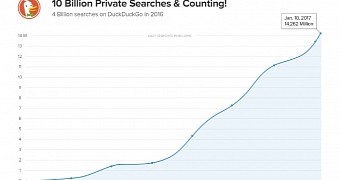DuckDuckGo is particularly happy to announce it has served 10 billion searches, as well as hit 14 million searches in a day on January 10th.
Gabriel Weinberg, the founder of DuckDuckGo, explains in a blog post that they are proud of their achievement, especially since all the searches were performed anonymously. What’s even cooler for DuckDuckGo is that 4 billion of those happened in 2016, indicating an accelerating growth rate.
“People are actively seeking out ways to reduce their digital footprint online. For example, a Pew Research study reported ‘40% think that their search engine provider shouldn’t retain information about their activity,’” he writes.
The company also donated $225,000 to nine organizations that have been working diligently to raise the standard of trust in the online world, including the Freedom of the Press Foundation, TOR Project, and Fight for the Future.
Interest in DuckDuckGo has grown steadily in the last years
The rise in numbers isn’t exactly surprising in the past few years. Ever since the Snowden revelations, interest for DuckDuckGo has risen slowly, but surely. Now, with Donald Trump landing in the White House, things are even more dire for those who seek security online.
His nominee for Attorney General thinks that encryption is the bee’s knees as long as it doesn’t stop law enforcement from snooping into people’s phones and so on. Trump himself believes that companies should grant access to encrypted data or hand over the keys for authorities to decrypt it themselves at any time. Overall, it’s not a great time regarding online security.
Of course, DuckDuckGo is so far from Google that it barely even makes a dent. In fact, Google serves about 40,000 queries a second. That means that, throughout the day, the number reaches 3.5 billion. In short, it takes Google a little over three days to deliver the number of searches DuckDuckGo has delivered in the past nine years.
DuckDuckGo provides anonymous searches to its users and does not retain any information about the person's identity.

 14 DAY TRIAL //
14 DAY TRIAL //